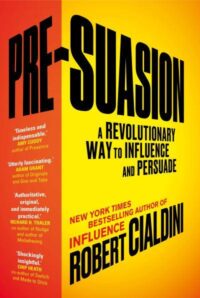Reading Notes for:


Commanders of Attention 2: The Magnetizers
Besides the persuasive advantages of drawing attention to a particular stimulus, there is considerable benefit to holding it there. The communicator who can fasten an audience’s focus onto the favorable elements of an argument raises the chance that the argument will go unchallenged by opposing points of view, which get locked out of attention as a consequence.
Certain kinds of information do, in fact, combine initial pulling power with staying power. Information about oneself, for example, packs that potent one-two punch.
In the province of personal health, when recipients get a message that is self-relevant because it has been tailored specifically for them (for example, by referencing the recipient’s age, sex, or health history), they are more likely to lend it attention, find it interesting, take it seriously, remember it, and save it for future reference—all
Purely from an effectiveness standpoint, any health communicator who has not fully investigated the potential use of such tools should be embarrassed.
Suppose you are a persuasion consultant approached to help market a new underarm antiperspirant to NASCAR dads. Let’s call it Pit Stop. Suppose further that the product has concrete, convincing scientific evidence of its superior effectiveness, which the manufacturer’s advertising agency plans to feature in its launch ads. But the agency is unsure about what to say first to draw audience attention to the rest of the ad and its compelling case. That’s why it has come to you, to get your opinion on the lead-in lines of ad copy, which read:
“After all these years, people might accept that antiperspirants just aren’t gonna get any better. They might even accept the ugly stains on clothes from hot days and hard work. They won’t have to anymore.”
What seemingly minor wording change could you suggest to improve the odds that the Pit Stop campaign will be a big success,
It would be to replace the externalizing words people and they in the opener with the personalizing pronoun you.
Your small modification will enhance audience attitude toward the product. Of course, because self-relevant cues only bring attention—not automatic approval—to a message, a strong subsequent case for Pit Stop was necessary within your ad to make the switch to “you’s” outperform the original ad. As the Ohio State study also demonstrated, if the rest of your ad had provided feeble evidence for Pit Stop’s effectiveness, the switch to a personalized introduction would have made the now-more-attentive audience less favorable to the product as a result.
Here, then, is another lesson in pre-suasion available for your use: when you have a good case to make, you can employ—as openers—simple self -relevant cues (such as the word you) to predispose your audience toward a full consideration of that strong case before they see or hear it.
There’s another type of setting in which the attention-gripping quality of self-relevant cues can affect persuasive success: meetings or gatherings where.
The next-in-line effect
Let’s say that because you have a terrific plan in mind, you are looking forward to attending a meeting at work designed to attack a recurring staffing problem. Let’s also say that the group meets often enough that everyone is familiar with the other participants and the basic format of the meeting: each member around the table is supposed to take a turn providing an initial position-and-recommendation statement. Finally, let’s say you’ve noticed that one of those turn takers is Alex, a manager who reliably wields the most influence at the meetings. He usually determines the problem-solving path the group eventually takes.
How might you sail the waters of your meeting more expertly than your first inclination suggested? I’d propose charting a course that takes into account both the next-in-line effect and the what’s-focal-is-presumed-causal effect. Take a spot at the table across from Alex where (1) he’ll be sufficiently distant from his own presentation to hear yours fully, and (2), because of your visual prominence, he’ll see you as fully responsible for the insights within your fine recommendation for resolving the problem. Of course, if you haven’t come up with a creditably reasoned solution to the problem, you might want to grab a chair right next to his so that in his self-focus-induced bubble, he won’t likely register the fact.
